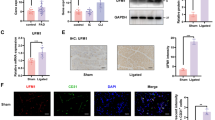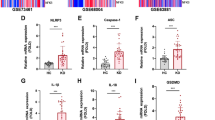Abstract
Aims
Circulating endothelial progenitor cells (EPCs) play a key role in maintaining endothelial function. Dysfunction of EPCs is associated with the cardiovascular complication of diabetes. The purpose of this study is to investigate the direct effects of hyperinsulinemia on EPCs and the underlying mechanisms.
Methods
EPCs isolated from healthy adults were cultured with various concentrations of insulin (control group, without insulin; physiological insulin group, 10 nM insulin and hyperinsulinemia group, 100 nM insulin) with or without phosphatidylinositol-3-kinase (PI3-K) inhibitor (LY294002, 5 µM), endothelial nitric oxide synthase (eNOS) inhibitor (l-NG-nitro-arginine methyl ester (l-NAME), 100 µM), sodium nitroprusside (SNP, 25 µM), p38 mitogen-activated protein kinase(MAPK) inhibitor (SB203580, 5 µM) or extracellular signal-regulated kinases (ERK) 1/2 inhibitor (PD98059, 10 µM). Proliferation, tube formation, and apoptosis of EPCs were determined. Expressions of eNOS, PI3-K, protein kinase B (Akt), p38 MAPK, and ERK 1/2 were assessed.
Results
Hyperinsulinemia caused a significant decrease in proliferation and tube formation abilities than control group. Hyperinsulinemia increased apoptosis rate of EPCs than control group. Furthermore, hyperinsulinemia downregulated phosphorylation of eNOS, PI3-K and Akt, and upregulated phosphorylation of p38 MAPK and ERK. SNP could restore impaired tube formation induced by hyperinsulinemia. P38 MAPK inhibitor but not ERK inhibitor could decrease apoptosis induced by hyperinsulinemia.
Conclusion
Hyperinsulinemia impaired EPCs’ tube formation ability by downregulation of PI-3K/Akt/eNOS pathway. Hyperinsulinemia induced apoptosis of EPCs via upregulation of p38 MAPK.








Similar content being viewed by others
References
Sukmawati D, Tanaka R (2015) Introduction to next generation of endothelial progenitor cell therapy: a promise in vascular medicine. Am J Transl Res 7:411–421
Makino H, Miyamoto Y, Kikuchi-Taura A et al (2015) Decreased levels of circulating CD34 + cells are associated with coronary heart disease in Japanese patients with type 2diabetes. Diabetes Invest 6:473–478
Capla JM, Grogan RH, Callaghan MJ et al (2007) Diabetes impairs endothelial progenitor cell–mediated blood vessel formation in response to hypoxia. Plast Reconstr Surg 119:59–65
Tan Q, Qiu LG, Li GP et al (2010) Transplantation of healthy but not diabetic outgrowth endothelial cells could rescue ischemic myocardium in diabetic rabbits. Scand J Clin Lab Invest 70:313–321
Choi JH, Gimble JM, Vunjak-Novakovic G, Kaplan DL (2010) Effects of Hyperinsulinemia on lipolytic function of three-dimensional adipocyte endothelial co-cultures. Tissue Eng Part C Methods 16:1157–1165
Mackesy DZ, Goalstone ML (2011) Insulin augments tumor necrosis factor-alpha stimulated expression of vascular cell adhesion molecule-1 in vascular endothelial cells. J Inflamm 8:34–38
Breen DM, Chan KK, Dhaliwall JK et al (2009) Insulin increases reendothelialization and inhibits cell migration and neointimal growth after arterial injury. Arterioscler Thromb Vasc Biol 29:1060–1066
Cubbon RM, Rajwania A, Wheatcroft SB (2007) The impact of insulin resistance on endothelial function, progenitor cells and repair. Diabetes Vasc Dis Res 4:103–111
Taguchi K, Sakata K, Ohashi W et al (2014) Tonic Inhibition by G protein–coupled receptor kinase 2 of Akt/endothelial nitric-oxide synthase signaling in human vascular endothelial cells under conditions of hyperglycemia with high insulin levels. J Pharmacol Exp Ther 349:199–208
Tan Q, Zhang S, Qi XM, Zou X, Sun Q (2017) Permanent atrial fibrillation impairs the function of circulating endothelial progenitor cells. Postgrad Med 126:198–204
Seeger FH, Haendeler J, Walter DH et al (2005) p38 mitogen-activated protein kinase downregulates endothelial progenitor cells. Circulation 111:1184–1191
Chang JL, Li YM, Huang Y et al (2010) Adiponectin prevents diabetic premature senescence of endothelial progenitor cells and promotes endothelial repair by suppressing the p38 MAP Kinase/p16INK4A signaling pathway. Diabetes 59:2949–2959
Sheng ZL, Ju CW, Li B et al (2018) TWEAK promotes endothelial progenitor cell vasculogenesis to alleviate acute myocardial infarction via the Fn14NFκB signaling pathway. Exp Ther Med 16:4019–4029
Baltieri N, Guizoni DM, Victorio JA, Davel AP (2018) Protective role of perivascular adipose tissue in endothelial dysfunction and insulin-induced vasodilatation of hypercholesterolemic LDL receptor-deficient mice. Front Physiol 19:229
Schinzari F, Tesauro M, Cardillo C (2018) Increased endothelin-1-mediated vasoconstrictor tone in human obesity: effects of gut hormones. 27:S69–S81
Liu Z, Cao WH (2009) p38 mitogen-activated protein kinase: a critical node linking insulin resistance and cardiovascular diseases in type 2 diabetes mellitus. Endocr Metab Immune Disord Drug Targets 9:38–46
Nigris VD, Pujadas G, Sala LL et al (2015) Short term high glucose exposure impairs insulin signaling in endothelial cells. Cardiovasc Diabetol 14:114–121
Chopra H, Hung MK, Kwong DL, Zhang CF, Pow EHN (2018) Insights into endothelial progenitor cells: origin, classification, potentials, and prospects. Stem Cells Int 18:9847015
Mahmoud AM, Ali MM, Miranda ER et al (2017) Nox2 contributes to hyperinsulinemia-induced redox imbalance and impaired vascular function. Redox Biol 13:288–300
Liang C, Ren YS, Tan HB et al (2009) Rosiglitazone via upregulation of Akt/eNOS pathways attenuates dysfunction of endothelial progenitor cells, induced by advanced glycation end products. Br J Pharmacol 158:1865–1873
Chen YH, Lin SJ, Lin FY et al (2007) High glucose impairs early and late endothelial progenitor cells by modifying nitric oxide-related but not oxidative stress-mediated mechanisms. Diabetes 56:1559–1568
Brown AE, Palsgaard J, Borup R et al (2015) p38 MAPK activation upregulates proinflammatory pathways in skeletal muscle cells from insulin-resistant type 2 diabetic patients. Am J Physiol Endocrinol Metab 308:E63–E70
Arnette D, Gibson TB, Lawrence MC et al (2003) Regulation of ERK1 and ERK2 by glucose and peptide hormones in pancreatic beta cells. J Biol Chem 278:32517–32525
Pereira S, Yu WQ, Moore J, Mori Y, Tsiani E, Giacca A (2016) Effect of a p38 MAPK inhibitor on FFA-induced hepatic insulin resistance in vivo. Nutr Diabetes 6: e210
Lawrence MC, McGlynn K, Park B-H, Cobb MH (2005) ERK1/2-dependent activation of transcription factors required for acute and chronic effects of glucose on the insulin gene promoter. J Biol Chem 280:26751–26759
Nandipati KC, Subramanian S, Agrawal DK (2017) Protein kinases: mechanisms and downstream targets in inflammation mediated obesity and insulin resistance. Mol Cell Biochem 426:27–45
Madeddu P, Kraenkel N, Barcelos LS et al (2008) Phosphoinositide 3 -kinase gamma gene knockout impairs postischemic neovascularization and endothelial progenitor cell functions. Arterioscler Thromb Vasc Biol 28:68–76
Zhang Y, Herbert BS, Rajashekhar G et al (2009) Premature senescence of highly proliferative endothelial progenitor cells is induced by tumor necrosis factor-alpha via the p38 mitogen-activated protein kinase pathway. FASEB J 23:1358–1365
Corre I, Paris F, Huot J (2017) The p38 pathway, a major pleiotropic cascade that transduces stress and metastatic signals in endothelial cells. Oncotarget 8:55684–55714
House L, Morris R, Barnes T et al (2015) Tissue inflammation and nitric oxide-mediated alterations in cardiovascular function are major determinants of endotoxin-induced insulin resistance. Cardiovasc Diabetol 14:56–72
Henriksen EJ, Diamond-Stanic MK, Marchionne EM (2011) Oxidative stress and the etiology of insulin resistance and type 2 diabetes. Free Radic Biol Med 51:993–999
Funding
This article was supported by Hebei Province technology supporting projects (16277720D).
Author information
Authors and Affiliations
Corresponding author
Ethics declarations
Conflict of interest
All authors declare that they have no conflict of interest.
Ethical approval
This study was appoved by ethical committee of Qinhuangdao First hospital (2016D005).
Informed consent
All participants provided informed consent prior to their participation.
Additional information
Managed By Massimo Porta.
Publisher’s Note
Springer Nature remains neutral with regard to jurisdictional claims in published maps and institutional affiliations.
Electronic supplementary material
Below is the link to the electronic supplementary material.
Rights and permissions
About this article
Cite this article
Tan, Q., Li, Y., Li, X. et al. Hyperinsulinemia impairs functions of circulating endothelial progenitor cells. Acta Diabetol 56, 785–795 (2019). https://doi.org/10.1007/s00592-019-01314-9
Received:
Accepted:
Published:
Issue Date:
DOI: https://doi.org/10.1007/s00592-019-01314-9




